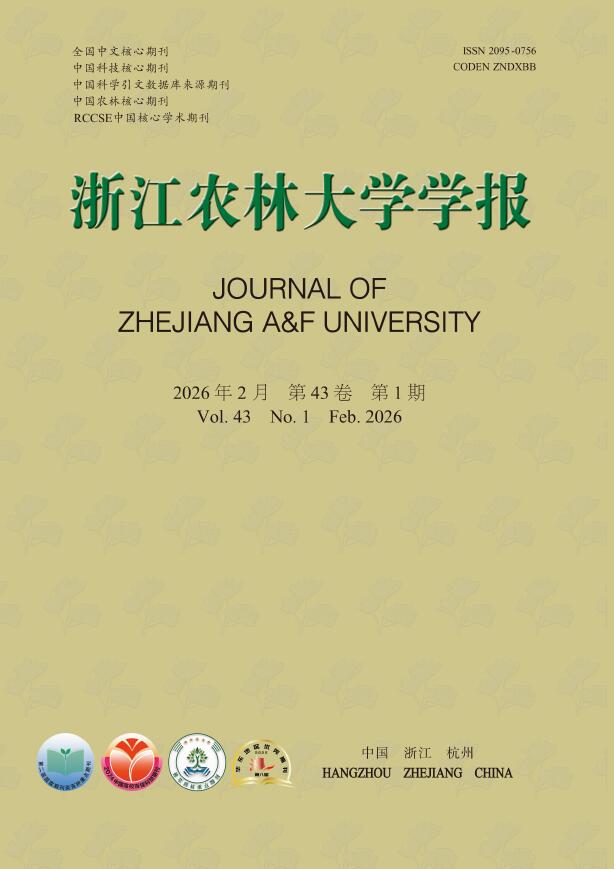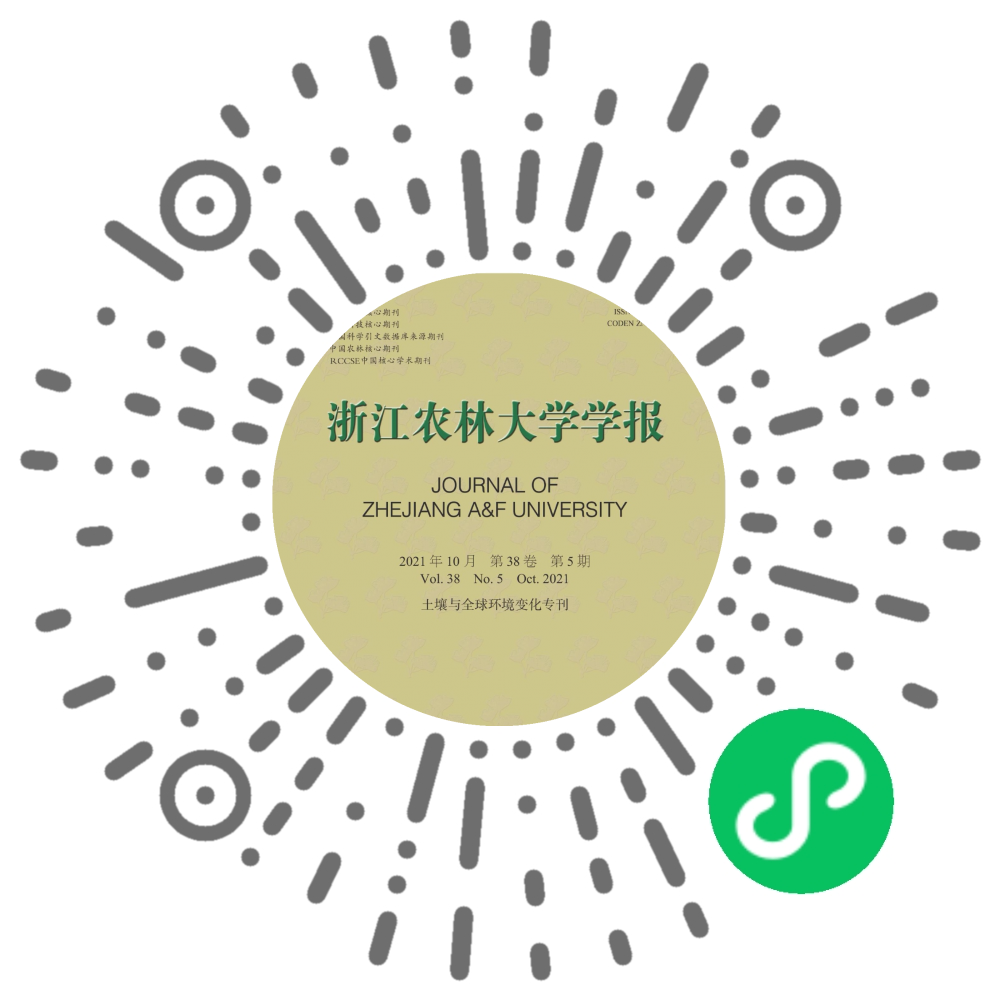1997 Vol. 14, No. 3
1997, 14(3): 213-219.
Abstract:
Using the background materials of Chinese fir seed orchard at 1. 5 offspring in Hengfan Forest Farm, an observation was made on the dynamic of individual cone bearing number, the relationship between the colonial structure and the seed yield, cone economic traits and effect of ecological factors. The seed yield in the orchard was chiefly affected by planting density, cone number of each plant , cone weight and seed-extracting percentage. An experimental formula on seed yield was suggested. In 1995, the 10-year seed orchard obtained a seed yield of 243 kg hm- 2. A reasonable colonial structure of bumper harvest was established in existing density of 525 plants hm- 2, crown sensity of 0. 6, averag eset ting numbers of 661. 9 per plant and seed-extracting percentage of 6. 2%.
Using the background materials of Chinese fir seed orchard at 1. 5 offspring in Hengfan Forest Farm, an observation was made on the dynamic of individual cone bearing number, the relationship between the colonial structure and the seed yield, cone economic traits and effect of ecological factors. The seed yield in the orchard was chiefly affected by planting density, cone number of each plant , cone weight and seed-extracting percentage. An experimental formula on seed yield was suggested. In 1995, the 10-year seed orchard obtained a seed yield of 243 kg hm- 2. A reasonable colonial structure of bumper harvest was established in existing density of 525 plants hm- 2, crown sensity of 0. 6, averag eset ting numbers of 661. 9 per plant and seed-extracting percentage of 6. 2%.
1997, 14(3): 220-224.
Abstract:
Observations of the fiber morphology and basic density of fast-growing Chinese fir in Lin an City, Kaihua County and Qingyuan County of Zhejiang Province showed that at the breast height fiber length increased with the increase of annual ring from the pitch outwards. From the base of a shoot to terminal the average fiber length ( L ) decreased, which varied from place to place, LLin an LKaihua LQingyuan. The ratio of length to width increased with the growth of annual rings. Basic density ( ) at the breast height of the fast-growing Chinese fir waskaihua Lin an Qingyuan. The variation in basic densityat dif ferent height of the same Chinese fir was that there was a greater change at the base and the terminal of a shoot, than at the middle parts. From the pitch outwards, the basic density decreased from 2~4 annual rings, but increased evenly and gradually af ter the sixth annual ring. The difference of hasic density was obvious among the different Chinese firareas.
Observations of the fiber morphology and basic density of fast-growing Chinese fir in Lin an City, Kaihua County and Qingyuan County of Zhejiang Province showed that at the breast height fiber length increased with the increase of annual ring from the pitch outwards. From the base of a shoot to terminal the average fiber length ( L ) decreased, which varied from place to place, LLin an LKaihua LQingyuan. The ratio of length to width increased with the growth of annual rings. Basic density ( ) at the breast height of the fast-growing Chinese fir waskaihua Lin an Qingyuan. The variation in basic densityat dif ferent height of the same Chinese fir was that there was a greater change at the base and the terminal of a shoot, than at the middle parts. From the pitch outwards, the basic density decreased from 2~4 annual rings, but increased evenly and gradually af ter the sixth annual ring. The difference of hasic density was obvious among the different Chinese firareas.
1997, 14(3): 225-230.
Abstract:
In order to forecast accurately height of each diameter class, the relationship between height curve, stand age, site and stand density was analysed using data of sample stand and permanent sample plot. The result sindicated close relations between height curve and stand age, site. Height curve moved up-right with the increase of stand age and site, and was not related to stand density. With a view to solving existing problems, the author introduced the site and stand age into the height curve model, establishing 13 new height curve models by means o f double regression. Height curve models were imitated viaiterative method using data of 200 sample plots. By comparison, Richards function with biology meaning was selected as the standard model, and the standard heigt curve equation of masson pine plantations in Guizhou was suggested. The forecast equation proved applicable in the regions.
In order to forecast accurately height of each diameter class, the relationship between height curve, stand age, site and stand density was analysed using data of sample stand and permanent sample plot. The result sindicated close relations between height curve and stand age, site. Height curve moved up-right with the increase of stand age and site, and was not related to stand density. With a view to solving existing problems, the author introduced the site and stand age into the height curve model, establishing 13 new height curve models by means o f double regression. Height curve models were imitated viaiterative method using data of 200 sample plots. By comparison, Richards function with biology meaning was selected as the standard model, and the standard heigt curve equation of masson pine plantations in Guizhou was suggested. The forecast equation proved applicable in the regions.
1997, 14(3): 231-236.
Abstract:
Ten trace elements in needles of Pinus massoniana from 10 provenances were analysed during dormancy with an Inductively Couped Plasma Quantometer ( ICPQ) . And the annaual growth of DBH and height was measured. The concent ration of three elements was too low to be determined by ICPQ. Variation of the trace element was noted among provenances. Coefficients of the variation tend to be smaller with the decrease of the element concentration. Contents of severa l elements were negatively correlated with the latitude and the longitude of provenances. An analysis of stepwise regression between trace elements and the growth o f both DBH and height indicated that the content of Li could be used as an early test factor for the growth of Pinus massoniana.
Ten trace elements in needles of Pinus massoniana from 10 provenances were analysed during dormancy with an Inductively Couped Plasma Quantometer ( ICPQ) . And the annaual growth of DBH and height was measured. The concent ration of three elements was too low to be determined by ICPQ. Variation of the trace element was noted among provenances. Coefficients of the variation tend to be smaller with the decrease of the element concentration. Contents of severa l elements were negatively correlated with the latitude and the longitude of provenances. An analysis of stepwise regression between trace elements and the growth o f both DBH and height indicated that the content of Li could be used as an early test factor for the growth of Pinus massoniana.
1997, 14(3): 237-241.
Abstract:
A test was made from 1986 to 1990 in a 9- to 10-year-old low-yielded Chinese chestnut stand. The post-test yield per unit area increased by 410. 5% on the average in sucessive 5 years, compared with that in 3 years before the test done. In 1990 the average yield reached 1 339.2 kg per hectare, which was 9 times as high as that in 3 years prior to the test. The main tecniques used in the improvement of the low-yielded stand included to pgraf ting for varietal change, replanting for increase of density, deep plowing for improvrmrnt of soil condition, applying sufficient basal manure, pruning, interplanting, doing top fertilizers and controlling both pests and diseases, all of which were, proved to be effective.
A test was made from 1986 to 1990 in a 9- to 10-year-old low-yielded Chinese chestnut stand. The post-test yield per unit area increased by 410. 5% on the average in sucessive 5 years, compared with that in 3 years before the test done. In 1990 the average yield reached 1 339.2 kg per hectare, which was 9 times as high as that in 3 years prior to the test. The main tecniques used in the improvement of the low-yielded stand included to pgraf ting for varietal change, replanting for increase of density, deep plowing for improvrmrnt of soil condition, applying sufficient basal manure, pruning, interplanting, doing top fertilizers and controlling both pests and diseases, all of which were, proved to be effective.
1997, 14(3): 242-246.
Abstract:
A study on flowering properties in 8 varieties of Chinese chestnuts and their association with low yield showed that forma tion of male inflo rescences was prior to that offemale flowers with the former being more than the latter. On each of frui t-bearing shoots, there were 4. 27 to 8. 62 male inf lorescences on an average for each female flower. Fruit-bearing shoots only accounted for 29. 75% in all grown from those capable of bearing fruiting shoots and only 2. 44 female flowers were found on each of fruiting shoots bearers. Both length and thickness of a fruit-bearing shoot were positively corelative to its ability to be a fruiting shoot bearer. Resulting from their bad development after fruiting, fruit bearing shoots decreasingly converted to fruiting shoot bearers, which leads to fewer fruits and further the low yield.
A study on flowering properties in 8 varieties of Chinese chestnuts and their association with low yield showed that forma tion of male inflo rescences was prior to that offemale flowers with the former being more than the latter. On each of frui t-bearing shoots, there were 4. 27 to 8. 62 male inf lorescences on an average for each female flower. Fruit-bearing shoots only accounted for 29. 75% in all grown from those capable of bearing fruiting shoots and only 2. 44 female flowers were found on each of fruiting shoots bearers. Both length and thickness of a fruit-bearing shoot were positively corelative to its ability to be a fruiting shoot bearer. Resulting from their bad development after fruiting, fruit bearing shoots decreasingly converted to fruiting shoot bearers, which leads to fewer fruits and further the low yield.
1997, 14(3): 247-249.
Abstract:
A study on 3 kinds of silvicultural modes showed that planting with seedling sprouts followed by grafting in the same or following year and planting by directly sowing seeds followed by grafting in the following year could attain a well-established seedling rate of over 77. 00%. A second complementary grafting could have this rate increased to 100% and all of the seedlings grew well. Each mode can be selectively used in production according to specific situation.
A study on 3 kinds of silvicultural modes showed that planting with seedling sprouts followed by grafting in the same or following year and planting by directly sowing seeds followed by grafting in the following year could attain a well-established seedling rate of over 77. 00%. A second complementary grafting could have this rate increased to 100% and all of the seedlings grew well. Each mode can be selectively used in production according to specific situation.
1997, 14(3): 250-254.
Abstract:
Studied the effects of 60Co-radiation on mi ldew poorf, insect biting prevention, water loss, and conservation percentage of Henry chestnut fruits during storage period. Made a physical preservation technique with low dosage ( 0. 5 kGy ) 60Co-radiation, plasticsake packing, and low storage temperature ( 3℃~ 5℃ ) .
Studied the effects of 60Co-radiation on mi ldew poorf, insect biting prevention, water loss, and conservation percentage of Henry chestnut fruits during storage period. Made a physical preservation technique with low dosage ( 0. 5 kGy ) 60Co-radiation, plasticsake packing, and low storage temperature ( 3℃~ 5℃ ) .
1997, 14(3): 255-261.
Abstract:
Kiwiberry Kuimi 79-5 set fruits in mid May and its fruits could be picked in early October. The enlarging period of fruits lasted 50~55 d. White fruit hearts, dark seed coats and high brown exocarps could be indicators for collection. The most suitable period for harvesting was 15 days after seed maturation when the fruits had the maximum size and wight and a stable species gravity, and contained the most soluble sugar of 1. 195 0 g kg- 1 and reducing sugar of 3. 434 5 g kg- 1 . The protein reached 6. 5% , and Vitamin Cand organic acid went down to 532. 0 mg kg- 1 and 1. 05% respectively. The relations between fruit shape, nutritive metabolism, fruit growth and specific gravity were discussed.
Kiwiberry Kuimi 79-5 set fruits in mid May and its fruits could be picked in early October. The enlarging period of fruits lasted 50~55 d. White fruit hearts, dark seed coats and high brown exocarps could be indicators for collection. The most suitable period for harvesting was 15 days after seed maturation when the fruits had the maximum size and wight and a stable species gravity, and contained the most soluble sugar of 1. 195 0 g kg- 1 and reducing sugar of 3. 434 5 g kg- 1 . The protein reached 6. 5% , and Vitamin Cand organic acid went down to 532. 0 mg kg- 1 and 1. 05% respectively. The relations between fruit shape, nutritive metabolism, fruit growth and specific gravity were discussed.
1997, 14(3): 262-266.
Abstract:
Canned bamboo shoot residues of Phyllostachys prominens consists of bamboo shoot sheath (culm leaf) and bamboo shoot (culm). Bamboo shoot (culm) was rich in protein ( 20. 6% ) and poor in lignin ( 2. 7% ); bamboo shoot sheath ( culm leaf ) contains protein ( 12. 3% ), cellulose( 32. 8% ), pentosan ( 25. 0% ) and lignin( 13. 9% ). Dilute H2SO4 prehydroly sed bamboo shoot sheath was used as carbon source in cellulase production by Trichoderma reesei Rut C30. After 5 days, obtained enzyme solution had a FP active of 1. 9 IU mL- 1 and cellulase production residue was more proteinous ( 25. 4% protein) than shoot sheath. Dilute H2 SO4 prehydrolused bamboo shoot residues used as subst rate, enzyme-subst rate ratio 12 IU g- 1 dry residues. The yield of enzymatic hydro lysis could reach 80. 1% ( culm leaf ) and 82. 0% (culm) . The sugar solution of prehydrolysis and enzymatic hydrolysis could be used to produce yeast. The residues of cellulase production and enzymatic hydrolysis increased in feed value.
Canned bamboo shoot residues of Phyllostachys prominens consists of bamboo shoot sheath (culm leaf) and bamboo shoot (culm). Bamboo shoot (culm) was rich in protein ( 20. 6% ) and poor in lignin ( 2. 7% ); bamboo shoot sheath ( culm leaf ) contains protein ( 12. 3% ), cellulose( 32. 8% ), pentosan ( 25. 0% ) and lignin( 13. 9% ). Dilute H2SO4 prehydroly sed bamboo shoot sheath was used as carbon source in cellulase production by Trichoderma reesei Rut C30. After 5 days, obtained enzyme solution had a FP active of 1. 9 IU mL- 1 and cellulase production residue was more proteinous ( 25. 4% protein) than shoot sheath. Dilute H2 SO4 prehydrolused bamboo shoot residues used as subst rate, enzyme-subst rate ratio 12 IU g- 1 dry residues. The yield of enzymatic hydro lysis could reach 80. 1% ( culm leaf ) and 82. 0% (culm) . The sugar solution of prehydrolysis and enzymatic hydrolysis could be used to produce yeast. The residues of cellulase production and enzymatic hydrolysis increased in feed value.
1997, 14(3): 267-272.
Abstract:
Baishanzu Nature Reserveis located in southern Zhejiang. The Insect Scientific Expedition to Baishanzu was carried out in 1993~1995. There are 22 orders, 256 families, 1364 genera and 2203 species, of which 9 genera and 250 species are new to science. Insect fauna of Baishanzu are characterized by the following features: The insect fauna of Baishanzu belongs to Oriental Faunal Region. The insect community stands instable equilibrium, which benifits by abundant plant flora, plentiful natural enemies and very few interference by mankind. The special terrain, vegetation, geological history of the area are pregnant with rich groups and endemic species of insects.
Baishanzu Nature Reserveis located in southern Zhejiang. The Insect Scientific Expedition to Baishanzu was carried out in 1993~1995. There are 22 orders, 256 families, 1364 genera and 2203 species, of which 9 genera and 250 species are new to science. Insect fauna of Baishanzu are characterized by the following features: The insect fauna of Baishanzu belongs to Oriental Faunal Region. The insect community stands instable equilibrium, which benifits by abundant plant flora, plentiful natural enemies and very few interference by mankind. The special terrain, vegetation, geological history of the area are pregnant with rich groups and endemic species of insects.
1997, 14(3): 273-276.
Abstract:
Death investigation was made in 1992~1996 for 11 species of exotic pines such as Pinus strobus var. chiapensis that had been introduced and planted in the nematode diseased area in Zhoushan City of Zhejiang Province. And sampling and parting Bursaphelenchus xylophilus from the dead pines ( excepting Pinus patula) were done. The results showed that there were 6 species of exotic pines to be infected natually with nematode disease in the diseased area, and Pinus patula , P. teada , P. caribaea , P. pseudostrobus and P . rigida P . teada had a strong resistance to the disease.
Death investigation was made in 1992~1996 for 11 species of exotic pines such as Pinus strobus var. chiapensis that had been introduced and planted in the nematode diseased area in Zhoushan City of Zhejiang Province. And sampling and parting Bursaphelenchus xylophilus from the dead pines ( excepting Pinus patula) were done. The results showed that there were 6 species of exotic pines to be infected natually with nematode disease in the diseased area, and Pinus patula , P. teada , P. caribaea , P. pseudostrobus and P . rigida P . teada had a strong resistance to the disease.
1997, 14(3): 277-280.
Abstract:
Cryptomeria fortunei is one of the main fast-growing trees in Zhejiang . Recent years, the pure Cryptomeria fortunei forests have been damaged by various insects continuously on a large scall in south areas of Zhejiang, with fruits, seeds, leaves and trunks all be damaged in varying degrees, which effects seriously the growth of the trees, and even leads to the death in large areas. This thesis describes the main injurio us insects of Cryptomeria fortunei and the ways of prevention and elimination.
Cryptomeria fortunei is one of the main fast-growing trees in Zhejiang . Recent years, the pure Cryptomeria fortunei forests have been damaged by various insects continuously on a large scall in south areas of Zhejiang, with fruits, seeds, leaves and trunks all be damaged in varying degrees, which effects seriously the growth of the trees, and even leads to the death in large areas. This thesis describes the main injurio us insects of Cryptomeria fortunei and the ways of prevention and elimination.
1997, 14(3): 281-286.
Abstract:
The value-keeping and value-adding of state-oned forest assets is that of state-owned net forest assets ( to be called state-owned interests). The examination indicators should include not only the value accountion indicators based on financial accounting data, but also the accounting indicators in kind based on the data of forest reserves investigation and statistics. The evaluation methods of value-keeping and value-adding for state-owned forest assets could adopt the way of composite index. There are nothing more than three ways of obtaining the value of compo site index: 100% , = 100% , and 100%, standing for the value-keeping, value-adding and devaluing of state-owned forest assets respectively.
The value-keeping and value-adding of state-oned forest assets is that of state-owned net forest assets ( to be called state-owned interests). The examination indicators should include not only the value accountion indicators based on financial accounting data, but also the accounting indicators in kind based on the data of forest reserves investigation and statistics. The evaluation methods of value-keeping and value-adding for state-owned forest assets could adopt the way of composite index. There are nothing more than three ways of obtaining the value of compo site index: 100% , = 100% , and 100%, standing for the value-keeping, value-adding and devaluing of state-owned forest assets respectively.
1997, 14(3): 287-291.
Abstract:
Some strategic choices to realize sustainable forestry development in China are proposed in terms of 6 different angles such as premise, bases, conditions, focal points, operation machanism, organizational guarantee, etc.
Some strategic choices to realize sustainable forestry development in China are proposed in terms of 6 different angles such as premise, bases, conditions, focal points, operation machanism, organizational guarantee, etc.
1997, 14(3): 292-297.
Abstract:
According to the theory of management science and information system, this paper, taking Qing yuan Forest Farm of Zhejiang as an example, analyses the status-quo and characteristics of state-owned forest farms in southern China, and discusses the problems of information construction as well.
According to the theory of management science and information system, this paper, taking Qing yuan Forest Farm of Zhejiang as an example, analyses the status-quo and characteristics of state-owned forest farms in southern China, and discusses the problems of information construction as well.
1997, 14(3): 298-302.
Abstract:
This paper studies the effects of three site conditions, namely soil, reed and flood,on poplar growth in plains along the Changjiang River in Anhui Province, and suggests the measurements for cultivating planted forests of poplar with short-rotation in dif ferent site conditions.
This paper studies the effects of three site conditions, namely soil, reed and flood,on poplar growth in plains along the Changjiang River in Anhui Province, and suggests the measurements for cultivating planted forests of poplar with short-rotation in dif ferent site conditions.
1997, 14(3): 303-307.
Abstract:
With a view to increasing the landscape value of landscape-protection forests, promoting the ecological environment and developing the forestry and the tourist trade in the area, this paper discusses the guiding thoughts, the principles, range and methods of transforming the forest form, and suggests some solutions to the problems relating to the transformation.
With a view to increasing the landscape value of landscape-protection forests, promoting the ecological environment and developing the forestry and the tourist trade in the area, this paper discusses the guiding thoughts, the principles, range and methods of transforming the forest form, and suggests some solutions to the problems relating to the transformation.
1997, 14(3): 308-310.
Abstract:
This study was made from March to July in 1993. There were 11 species of Amphibia, belonging to 5 genera, 4 families and lorder. Among them Rana adenopleura was a new recorded species from Mt. Moganshan. The observation revealed that the feeding peak of Rana adenopleura was at 2: 00, 6: 00, 12: 00, 14: 00, 16: 00 and 18: 00
This study was made from March to July in 1993. There were 11 species of Amphibia, belonging to 5 genera, 4 families and lorder. Among them Rana adenopleura was a new recorded species from Mt. Moganshan. The observation revealed that the feeding peak of Rana adenopleura was at 2: 00, 6: 00, 12: 00, 14: 00, 16: 00 and 18: 00
1997, 14(3): 311-314.
Abstract:
Strengthening art education of university students has been oneof subjects attractive to the kingdom of ecducation and society in recent years. Function of art education, its present problems and the way to deal with it are discussed here in terms of reality of agricultural universities and forestry colleges so that art education could be fully understood by the public, especially by educators and students of agricultural universities and forestry colleges, who then take some effective measures thereafter to strengthen and improve education of art with a good environment favorable to education of people created.
Strengthening art education of university students has been oneof subjects attractive to the kingdom of ecducation and society in recent years. Function of art education, its present problems and the way to deal with it are discussed here in terms of reality of agricultural universities and forestry colleges so that art education could be fully understood by the public, especially by educators and students of agricultural universities and forestry colleges, who then take some effective measures thereafter to strengthen and improve education of art with a good environment favorable to education of people created.











